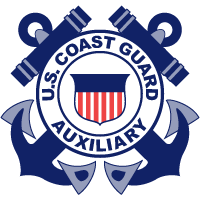Vessels over 26 feet need a placard explaining that oil discharge is prohibited. Check near the engine controls or engine compartment to see if it’s already installed on your boat. If it isn’t, you can get a copy of a standard placard here.
How about those expired flares? When you replace your pyrotechnic
visual distress signals, do you just throw the old ones in the trash, or
wait until July 4th and fire them across the harbor at your buddy’s
boat? Well, don’t do either, unless you really want a Federal felony
conviction.
We also have memos explaining how to make a VHF radio call and what’s up with the new DSC (Digital Selective Calling) radios.
Is your organization interested in collaborating with the Coast Guard Auxiliary to teach and encourage boating safety? Take a look at our Boating Safety Partnerships wiki and see what we can do together.
Have you been involved in a boating accident? Submit a Recreational Boating Accident form. You can also get the latest information on boating accident safety from our Recreational Boating Safety Outreach webpage.
There’s a lot of material here, so take your time. If you have questions, please feel free to click on the “About Flotilla 12-4” link to get in touch with us.
